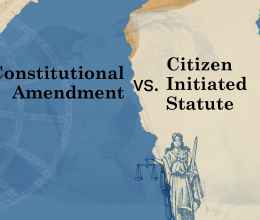All kids deserve to be treated as kids. The youth justice system was intended to be built with accountability and rehabilitation in mind, working to get all youth on the right path towards happy, productive adulthood. Unfortunately, we have seen over our series of youth justice blogs, that Ohio’s youth justice system does not always prioritize these goals. In November 2023, Governor Mike DeWine announced the formation of a Juvenile Justice Working group to right the ship and set Ohio’s youth justice system back on a path towards progress.
In September 2024, that working group released 26 recommendations with various legislative policy proposals for the Ohio General Assembly to enact. At the release of these recommendations Governor DeWine stated, “All kids deserve the opportunity to live up to their full, God-given potential, including youth who are incarcerated in state or local juvenile corrections facilities. We must send these youth home with the very best chance to succeed." We at the ACLU of Ohio intend to hold him to his word.
Smaller is Better
The first recommendation made in the Juvenile Justice Working Group Report and Recommendations was to move away from our current large-scale facilities, and instead, utilize smaller, more community-based facilities. This “smaller is better” model allows more community and family involvement in the system. Currently youth placed in our Juvenile Correctional Facilities are experiencing major challenges. These facilities have a documented history of mistreatment and abuse, low staffing and retention, and mismanagement leading to poor outcomes for youth.
While we know confinement in any capacity can be traumatic for youth, facilities that are closer to home allow for input and collaboration from family and community members. Local centers also have better staff and management systems that foster a low impact environment to get youth on the right track with holistic services and rehabilitation. This model also aligns with what we have seen works well in other states like Missouri, where youth see lower rates of recidivism and return with the skills necessary to turn their lives around.
Minimum Age of Commitment Raising
Currently, the minimum age of commitment, or the lowest age a youth can be confined in a Juvenile Correctional Facility (JCF) or placed in any sort of alternative placement in Ohio is 10 years old. According to the Working Group recommendations, only sixteen youth who were 13 years or younger were confined in a JCF or alternative placement by March of 2024. Because of this, the Working Group recommended that the minimum age should be raised from 10 years old to 14 years old. We know that the adverse effects of confinement are only exacerbated the younger a youth is. Youth of any age should not spend years in confinement but especially not youth as young as 10 years old.
Judicial Discretion when Adjudicating Gun Specifications
Presently, judges do not have discretion over commitment lengths for youth adjudicated with gun specifications. This means youth are handed mandatory sentences that can often exceed what the Working Group refers to as the “sweet spot” with commitment lengths. Youth experience a great deal of setbacks and negative outcomes because of increased lengths of stay: recidivism rates increase as length of stay increases, youth are less likely to graduate from high school, and, ultimately, without returning home, youth are not given a fair chance at redemption and reentry into their communities. We at the ACLU are in favor of giving our judges more discretion and allowing them to look at each child and issue on a case-by-case basis determining the best course of action that increases the likelihood a youth will be successfully rehabilitated and treated.
Mandatory Bindover
Mandatory bindover is the process by which a minor’s case is automatically sent to adult court for adjudication without a judge considering the facts, evidence, or circumstances of a case or of the child being charged. The working group recommends that the state should examine its practice of mandatory bindover, assess if it is truly a benefit to Ohio, and consider its elimination. At the ACLU we firmly say mandatory bindover should be eliminated. We know that when youth are boundover they have higher rates of recidivism, suffer abuses in the adult system (five times as often sexually assaulted, eight times more likely to commit suicide, and twice as likely to be beaten by staff or attacked with a weapon), and are taken out of the juvenile system where they are meant to receive proper care and treatment not afforded to them in the adult system. It should be up to judicial discretion and considered very seriously if a youth should be placed in the adult system, not done on an automatic basis with no consideration for their specific cases and needs.
We would like to thank the Governor’s Juvenile Justice Working Group for doing the long and challenging work to determine what can and should be done to re-envision the youth justice system in Ohio to be a more rehabilitative and successful space. There are some great ideas in this report; youth should be closer to home in smaller, well-staffed facilities and rehabilitated in the least restrictive environment possible, children as young as ten do not belong behind bars, and judicial discretion is key in determining the best path forward for so many of our youth.
We will push for these changes and urge Ohio’s General Assembly to listen to this report and implement the recommendations. All kids deserve to be treated as kids and given the tools to grow and flourish into happy, healthy adults.








